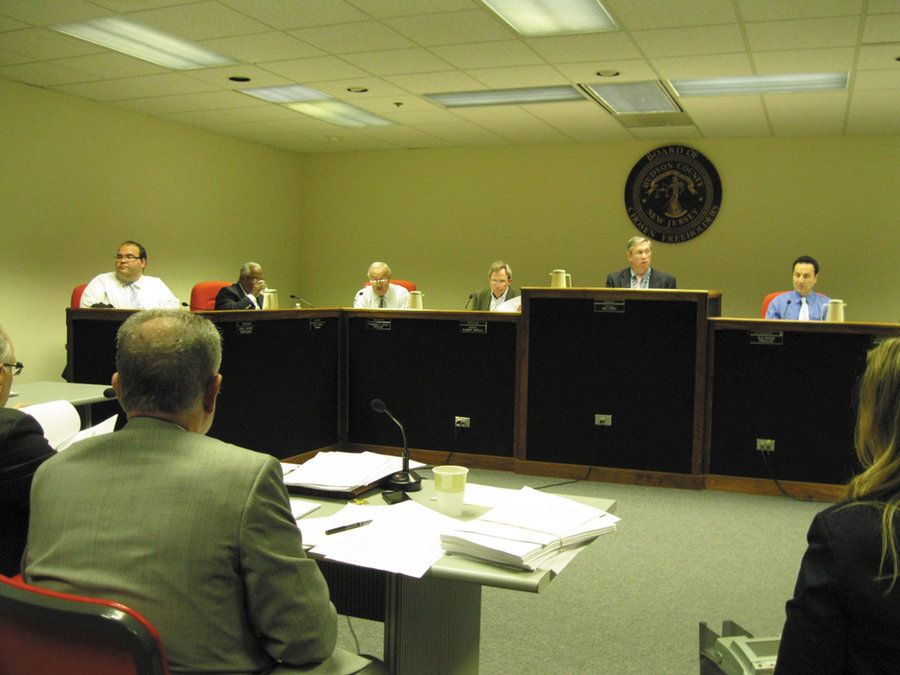Hudson County Sheriff Frank Schillari met with members of the Freeholders’ Public Safety Committee in a closed session to discuss the implementation of the volunteer deputy sheriff’s program – and agreed to consider the freeholders’ concerns when the program is implemented at some point later this year or early next year.
The freeholders raised questions at the Sept. 22 meeting about some aspects of the program, including applications that were received from former sheriff’s deputies in Passaic County.
“The Special Deputy Program is still in development while Sheriff Schillari and the Board of Freeholders fine tune the details.” – Mike Makarski
____________
In addition, sources said that some of the applicants had failed an initial psychological exam before passing a followup.
“The Special Deputy Program is still in development while Sheriff Schillari and the Board of Freeholders fine tune the details. In the coming weeks, the Sheriff’s Office will be seeking out qualified volunteers from Hudson County and formally launching the program,” said Mike Makarski, spokesman for Sheriff Frank Schillari, last week.
When the program was first proposed earlier this year, Freeholder Anthony Romano – a retired police captain – raised concerns that the county would be arming non-police to do police patrol duties. Those brought on as deputy police would still have to go through police academy training. Romano and the freeholder board said the county should seek out retired or laid off police officers who can use the unpaid position to maintain specific certifications in weapons handling and other areas.
Last week, the Sheriff’s Department presented the freeholders with a list of names of candidates, none of whom live in Hudson County where they are expected to do volunteer patrols. A number of them are former deputies from Passaic County who resigned their volunteer position last Dec. 31 just prior to a change of county administration there.
In a meeting with the Freeholder Public Safety Committee, Sheriff Schillari said the details of the program are still being worked out, and that no one has actually been appointed as deputy yet, nor have the duties been clearly defined.
While several freeholders said they do not have a problem with some of the proposed deputies coming from outside Hudson County, they would like the majority to be local.
“We agree that sheriff’s deputies should be used at parades, funerals, ceremonies, or governmental functions, as well as in helping to monitor surveillance cameras. We have some concerns about their being involved in patrols,” O’Dea said.
Freeholders want refund for Gabert’s trip to Poland
Although Hudson County Community College President Dr. Glen Gabert took a trip to Poland with the expectation of meeting up with educational people there, O’Dea said the college should not have paid for the trip once it was determined that there was no educational component.
O’Dea has asked Gabert to reimburse the county college for air fare and other costs that were associated with what amounted to a sight seeing trip.
Freeholders grilled Bill LaRosa, the director of cultural affairs and tourism for the Hudson County Office of Cultural and Heritage Affairs/Tourism Development, during the Sept. 20 Freeholder Caucus, following up on a series of memos to determine first the nature of the trip and what Gabert’s role was.
LaRosa said local officials had been invited to visit Poland by officials there, but that the trip was clearly a pleasure trip with all the county officials except Gabert using vacation time to make the trip and paying their own way.
Hudson County Chief of Staff Bill Gaughan went on the trip on behalf of County Executive Tom DeGise. Gaughan’s daughter, Eileen Gaughan, assistant director of the office of Cultural and Heritage Affairs, also went, as did LaRosa.
But LaRosa said each employee paid his/her own way and understood that it was a pleasure trip, not official. Gabert, however, told freeholders at a committee meeting prior to the caucus that he had met with some educational officials in Poland, but the original connections he sought did not occur.
LaRosa said Gabert had asked for a meeting with Poland’s education people, but that it could not be arranged.
O’Dea and other freeholders questioned why Gabert did not return from Poland after he learned an official meeting was not possible, but continued on for the full seven-day trip with the others.
Gabert apparently billed the college for the expenses incurred on the trip and did not use vacation days for the trip.
“We’re due to meet with representatives of the college to discuss the matter this week,” O’Dea said in a phone interview. “Apparently, the college is doing an audit of expenses.”
Freeholders move amendments to Living Wage Law
At the Sept. 22 meeting, the freeholders introduced four amendments to its proposed Living Wage Law, which would require vendors doing business with the county to pay their employees a wage significantly higher than minimum wage. The law would also require the vendors to provide medical coverage or pay an additional 20 percent of an employee’s salary to cover the cost of purchasing insurance. Other changes in the law will also require centers to provide their employees with at least a week vacation or a paid equivalent of 2 percent of the employee’s annual salary. The changes also increase from 60 to 90 days the time frame that vendors will have to implement the provisions of the law.
A public hearing and final vote on the amendments will take place Oct. 13 at 6 p.m.
“The amendments will preserve the board’s desire to ensure that employees working for vendors paid by the county receive a living wage and access to medical coverage while addressing some valid concerns raised by not-for-profits as to the financial impact of our proposed changes,” O’Dea said. “Most importantly, we will level the playing field and address the more critical issue of certain for profit vendors who were circumventing the medical and vacation benefit portions of the existing law by only hiring part time employees.”
